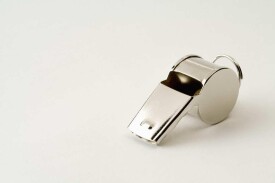共找到5條詞條名為哨子的結果 展開
哨子
富蘭克林文章
《哨子》是作者富蘭克林(美)所寫的一篇文章,主要簡述了作者小時候購買一個哨子而引發的前後的故事和心理的變化,這些心態的變化影響了作者的成長。
, ; , , , . , , , . .
You ask what I mean? You love stories, and will excuse my telling one of myself.
When I was a child of seven years old, my friends, on a holiday, filled my pocket with coppers. I went directly to a shop where they sold toys for children, and being charmed with the sound of a whistle, that I met by the way in the hands of another boy, I voluntarily offered and gave all my money for one. I then came home, and went whistling all over the house, much pleased with my whistle, but disturbing all the family. My, brothers, and sisters, and cousins, understanding the bargain I had made, told me I had given four times as much for it as it was worth; put me in mind what good things I might have bought with the rest of the money; and laughed at me so much for my folly, that I cried with vexation; and the reflection gave me more chagrin than the whistle gave me pleasure.
This, however, was afterward of use to me, the impression continuing on my mind; so that often, when I was tempted to buy some unnecessary thing, I said to myself, Don't give too much for the whistle; and I saved my money.
As I grew up, came into the world, and observed the actions of men, I thought I met with many, very many, who gave too much for the whistle.
When I saw one too ambitious of court favor, sacrificing his time in attendance on levees, his repose, his liberty, his virtue, and perhaps his friends, to attain it, I have said to myself, This man gives too much for his whistle.
When I saw another fond of popularity, constantly employing himself in political bustles, neglecting his own affairs, and ruining them by that neglect, He pays indeed, said I, too much for his whistle.
If I knew a miser, who gave up every, kind of comfortable living, all the pleasure of doing good to others, all the esteem of his fellow-citizens, and the joys of benevolent friendship, for the sake of accumulating wealth, Poor man, said I, you pay too much for your whistle.
When I met with a man of pleasure, sacrificing every laudable improvement of the mind, or of his fortune, to mere corporeal sensations, and ruining his health in their pursuit, Mistaken man, said I, you are providing pain for yourself, instead of pleasure; you give too much for your whistle.
If I see one fond of appearance, or fine clothes, fine houses, fine furniture, fine equipages, all above his fortune, for which he contracts debts, and ends his career in a prison, Alas! say I, he has paid dear, very dear, for his whistle.
When I see a beautiful, sweet-tempered girl married to an ill- natured brute of a husband, What a pity, say I, that she should pay so much for a whistle.
In short, I conceive that great part of the miseries of mankind are brought upon them by the false estimates they have made of the value of things, and by their giving too much for their whistles.
Yet I ought to have charity for these unhappy people, when I consider that, with all this wisdom of which I am boasting, there are certain things in the world so tempting, for example, the apples of King John, which happily are not to be bought; for if they were put to sale by auction, I might very easily be led to ruin myself in the purchase, and find that I had once more given too much for the whistle.
《哨子》 作者:富蘭克林[美]
我七歲的時候,有一次過節,大人們給我的衣袋裡塞滿了銅幣。我立刻向一家賣兒童玩具的店鋪跑去。半路上,我卻被一個男孩吹哨子的聲音吸引住了,於是我用所有的銅幣換了他這個哨子。回到家裡,我非常得意,吹著哨子滿屋子轉,卻打擾了全家人。我的哥哥、姐姐和表姐們知道我這個交易后,便告訴我,我為這個哨子付出了比它原價高四倍的錢。他們還告訴我,用那些多付的錢,我不知道可以買到多少好東西。大夥兒都取笑我傻,竟使我懊惱得哭了。回想起來,那隻哨子給我帶來的悔恨遠遠超過了給我的快樂。不過,這件事情後來卻對我很有用處,它一直保留在我的記憶中。因此,當我打算買一些不必的東西時,我便常常對自己說,不要為哨子花費太多,於是便節省了錢。
我長大了走進社會,觀察人們的作為,感到我遇到的很多很多的人,他們都為了一個哨子付出了過高的代價。
當我看見一個人過分熱衷於獵取恩寵榮祿,把自己的光陰犧牲在侍候權貴、謀求接見之中,為了得到這種機會,他不惜犧牲自己的自由、品德甚至於自己的朋友,我便對自己說,這個人為他的哨子付出了太高的代價。
當我看見另一個人醉心於名望,無休止地投身於政界的紛擾之中,卻忽視了自己的事,我說,他的確也為了他的哨子付出了過高的代價。
如果我聽說有個守財奴為了積累財產,寧願放棄各種舒適的生活、為別人做好事的一切樂趣、同鄉們對他的尊重,以及慷慨無私的友誼的快樂,我說,可憐的人啊,為了你的哨子,你付出了過高的代價。
當我遇到一個尋歡作樂的人,他不願使自己在精神或命運方面得到一切可讚美的改善,而僅僅為了達到肉體上的享受,為了這種需求,損壞了自己的身體,我就說,誤入歧途的人啊,你真是有福不享自找苦吃;為了你的哨子,你付出了太高的代價啊。
當我看到一個人沉迷於外表,或者是漂亮的裝束、講究的住宅、上等的傢具、精緻的設備,這一切都遠遠超出了他的收入的水平,為了得到這一切,他借債,最後以被投進監獄而告終,我說,天啊!為了他的哨子,他付出了太高太高的代價。
當我看到一個漂亮溫順的姑娘相信對方的甜言蜜語而嫁給一個生性惡劣、人面獸心的丈夫,我說,多麼遺憾呀,她為了一個哨子付出了太高的代價。
總之,我認為,他們所遭受的人類極大的悲苦都是由於他們對事物的價值做出了錯誤的估價而造成的,都是為了他們的哨子付出了太高的代價。(全文完)
然而,我應該可憐這些不幸的人們,經過殫思竭慮,我認為幸運的是世界是某些非常誘人的東西,例如約翰王的蘋果,是買不到的。如果把它們拿來拍賣,我可能會因購買而傾家蕩產,我將發現自己再度為哨子付出太多的代價。
再見吧,親愛的朋友,相信我將永遠忠於你,對你的情愛永不變心。
